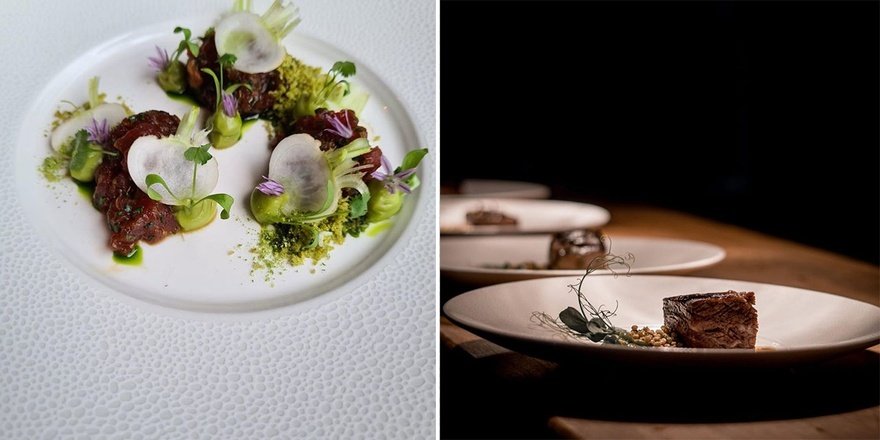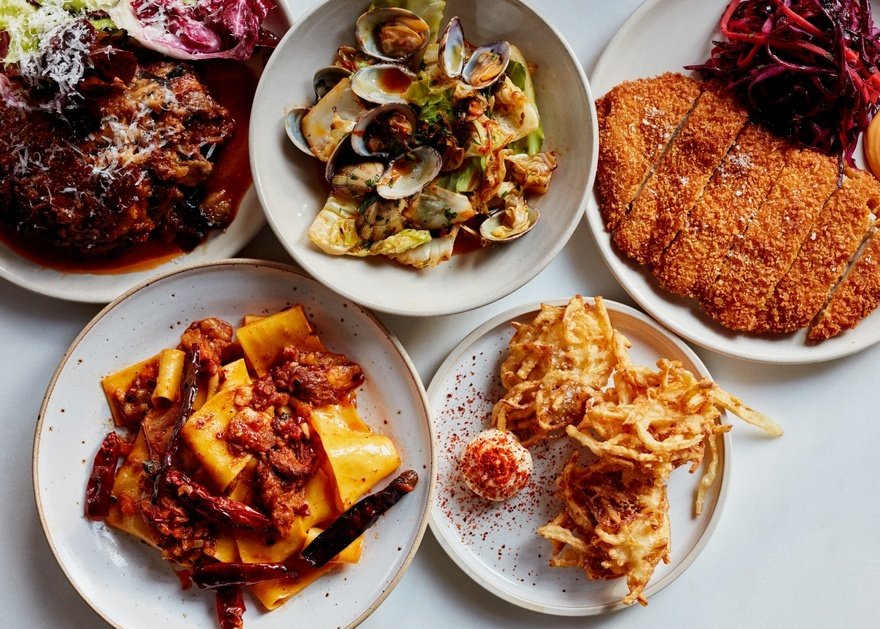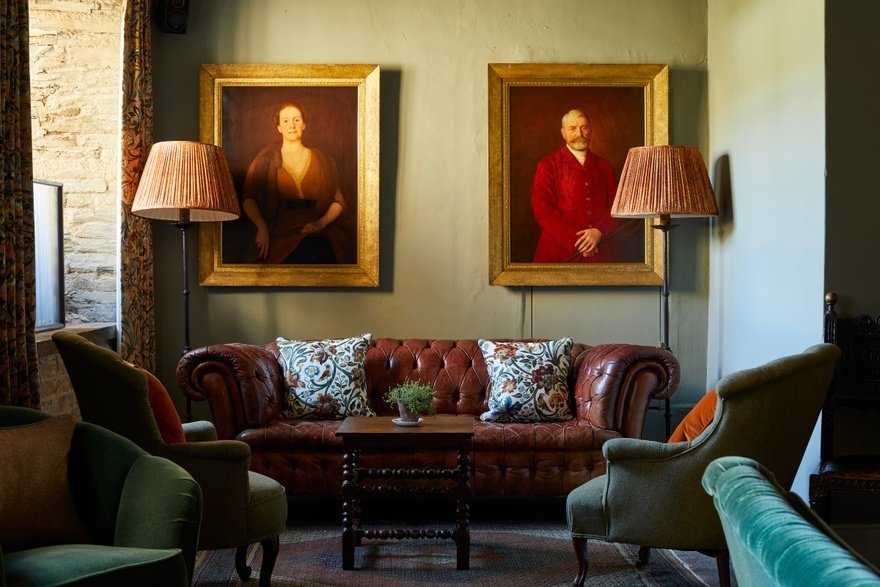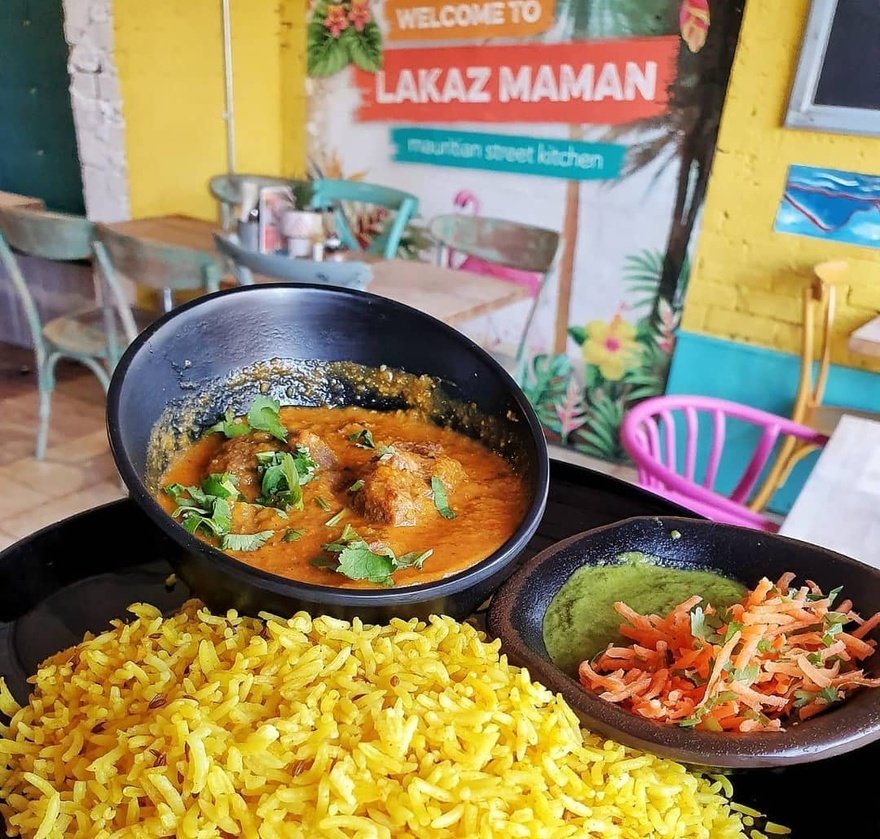Reviews: Jay Rayner finds Turnips in London's Borough a 'clever shift', Marina O'Loughlin says Ikoyi is 'genuinely thrilling'
The Observer's Jay Rayner finds a ‘clever' shift from market stall to pop-up restaurant at Turnips in London's Borough
At 5.30pm every Wednesday to Saturday, Turnips closes and most of the produce is shifted out, save for an escarpment of squash here or a hillside of apples there. Black drapes cover the emptied stands and high-top tables are brought in. Turnips becomes a small-plates restaurant, serving cocktails and a short menu of dishes priced at between £5 and £9.
To start, there are long rectangles of bread that have been deep-fried to a shattering, come-hither golden, alongside an airy, whipped and still warm sauce of Cheddar and garlic. Bruschetta are piled with a sea-green pesto made with cavolo nero, with just the edge of the leaf's bitterness, then topped with the sweetest of chopped tomatoes. A dinky, round Provençal courgette arrives, browned and burnished until just beginning to sag. It has been sliced open, scooped out and filled with a mess of tomatoes, basil and breadcrumbs.
A thick, cumin-boosted purée of sweet potato and lentils is formed into deep-fried croquetas. They arrive dotted with wasabi mayo, some of which hold the tiniest fronds of a purple leaf. It looks very pretty, but more importantly those croquetas are extravagantly moreish.
Two dishes miss the mark. A sizeable chunk of pork belly, the only meat on the menu, needs a longer, more complex trip through the oven so it slumps rather than puts up a struggle against my fork, though the sticky peach compôte on top is appreciated. Likewise, sweet-sour caramelised cauliflower is just a little wan and uninteresting. Then again, the brigade in the kitchen numbers just one. He's a young Scot with killer hair, also formerly from City Social, called Scott Murray, who works minor miracles with the most minimal of kit.
This feels like a clever response to these challenging circumstances. Eating outside is desirable right now. There is space to distance the tables. And then there's the Turnips stock, sales of which must be down right now. How better to deal with that than by serving some of it?
Price: small plates (Wednesday-Saturday), £5-£9; tasting menu (Thursday-Saturday), £65
Marina O'Loughlin of The Sunday Times finds Ikoyi's menu a captivating form of fusion in London's St James's
"Ikoyi builds its own spice-based cuisine", the website tells us, "around British micro-seasonality." They've recently tweaked the menu, replacing some of the intricate, labour-intensive and time-consuming dishes with fried chicken, beef rib suya (a riff on a popular west African street food of spice and peanut powder-crusted barbecued meat) and frill-free plantain.
Well, I say frill-free: four slices of the fruit, deliberately overripe, arrive looking almost starkly plain. But a bite into one, the palate flooding with its fragrant fudginess, and it's obvious Chan is still playing with flavours, here ginger and kombu (kelp) in a dish that dances smartly between sweet and savoury.
Equally unfaffed is creamed spinach ehuru, the sophisticated bastard child of west African efo riro (spinach stew) and the American steakhouse classic, a creamy jade-green slump scattered with seeds and tingling with the dark caramel of its eponymous spice, aka calabash nutmeg.
I'm almost pathetically pleased at a recognisable spice: the fried Landes chicken – not in a batter, the bronzed skin of the bird protecting brined flesh that's sinewy and muscular – comes with a remarkable sauce, a silky rendering of its offal, fruity and pungent with scotch bonnet chilli. So good that, like an overfed Oliver, I beg for more.
So is Ikoyi any good? Yes, absolutely: always intriguing, often genuinely thrilling. With the odd caveat: I don't love its version of suya, poshed up into something so haute it loses its edge, the meat almost off- puttingly yielding, the spicing tamed into a slick of sauce.
Is Ikoyi any good? Yes, absolutely: always intriguing, often genuinely thrilling
Price: £183 for two, including 12.5% service charge
Fay Maschler of the London Evening Standard finds ‘exotic beats' at Larry's in London's Peckham
Inspired, says the publicity, by the corner bars, diners and delis of New York, Larry's has the air of a child's classroom but with reclaimed emerald green Eames chairs that clash nicely with tables laminated in bright orange.
Snacks get us off to a slowish start. Potato latkes lack enough schmaltz in both senses of the word and drizzles of fermented chilli mayo don't cure their chilly stodginess. Larry's pickles fail to exhibit the snap of what otherwise might be called kosher pickles. ‘Nduja focaccia revs up momentum. Wiping the crisp surface through the pool of rust-coloured oil is definitely gratifying.
‘Nduja strikes again in the chicken liver ragù for pappardelle. "Earthy yet indulgent, like a mud treatment at a salon", pronounces Rhik. Garlic and XO sauce add strident emphasis to a dish of clams; gochujang jives with pork schnitzel with red cabbage. Are these exotic beats a tribute to Larry's talent for connecting? Perhaps. Certainly Mark Gurney's wine picks for the flexible, fashionable list are in keeping with their namesake's ability to mix and tweak. One of the house reds – Mas des Cabres from Languedoc at £29 – I can recommend enthusiastically.
Outstanding food and rooms with sea views at the Pig at Harlyn Bay, Cornwall, says Vicki Reeve in The Mail on Sunday
The beautifully renovated, Grade II-listed manor has 16th-century origins and medieval, Jacobean and Georgian features. Its elegant exterior, grounds and bountiful walled kitchen garden take my mind off social distancing, and amiable staff respect physical space while being anything but distant in personality.
Robin Hutson, founder of the Pigs, has a twinkle in his eye; his wife Judy, interior designer, spins yarns about catching couples in flagrante and the characters she's imagined she's decorating the hotels for.
My room, No 8 (of 11 in the manor house) is all moody dark green/grey tones with gnarly wooden floor, whopping great bed, and elaborately carved desk that demands a quill for writing. The pièce de résistance is a 15th-century stone frieze with mysterious sea beasts bordering the ceiling. The large bathroom has a rainfall shower and huge tub by the window overlooking a pretty terrace where guests gather. A blind provides privacy as I soak.
There are 15 more stylish bedrooms in the new slate Stonehouse adjacent to the manor and a quartet of Garden Wagons, which are like private suites – as well-designed and comfortable as the other rooms.
Dinner in the rustic panelled dining room is relaxed (no dress code, mismatching vintage crockery). Much of the seasonal menu is gleaned from the kitchen garden. Here's to a country house hotel that feels much more country home.
The Guardian's Grace Dent enjoys "precise, balanced and generous" cooking at the Curlew in Bodiam, East Sussex
On a very warm, midweek August evening, my two hours at the Curlew was almost as lovely as this job gets. Good, diligent, passionate yet unobtrusive service. Tables spaced so gloriously far apart, I felt a bit like I'd bought the pub.
The Curlew's [menu] is a single- sheet, ever-shifting, à la carte affair, divided into plain-speaking groups: snacks, meat, fish, vegetables and "whole". When they say "whole Creedy Carver duck", they really do mean it, gizzard fans: you get everything but the quack laid out on a slate.
I steered us instead towards the monkfish tail, which came with a heavenly jug of curried butter sauce. The cooking is precise, balanced and generous; if the Curlew has a signature dish, it's the miso-roasted cod, which tastes of blissful umami caramel and comes topped with samphire and the rather ominously named leaf salty fingers.
Pudding was a warm cherry bakewell-style tart with clotted cream. The cheese selection is possibly the most highfalutin offering being served in Great Britain today. That evening, it included Golden Cross goats' cheese, Lord London, Winterdale Shaw, Mayfield, Burwash Rose and Sussex Blue, and it came with some warm, just-baked buttery digestive biscuits, crackers, a tiny loaf of fresh bread, quince preserve, pickled walnuts, leaves, truffled honey and some homemade chutney.
Price: about £40 a head à la carte, plus drinks and service
Keith Miller writes in The Daily Telegraph that Mauritian street kitchen Lakaz Maman in Southampton has hit the perfect balance of vibrancy and health
The restaurant is the brainchild of a former MasterChef winner, Shelina Permalloo, a Sotonian of Mauritian heritage. The name translates as "mum's house": what's on offer is more street-foody than the chimerical beauties with which Permalloo will have wowed Gregg Wallace and John Torode.
Spicing is almost diffident compared with India; even the deep-fried dishes feel positively healthy. Sweetness and acidity come from lashings of fruit (pineapple, mango, tamarind), applied either directly as in pima sel, a chunky salad of apple, cucumber and pineapple dressed with chilli and a little salt, or via some fantastic sauces.
Everything we had, we loved: the salad, little battered cauliflower florets, spicy mini-cakes called gato piment, a mellow coconut-creamy fish curry, rougaille with mutton, even a none-too-August-friendly milk dumpling, delicately spiced and served with a neat little quenelle of Mauritian vanilla ice-cream, which steamed merrily.
Price: £55 for lunch for two










